Why You Should Care About the 2024 Hurricane Season
Some areas in the Atlantic breeding grounds for hurricanes are now, in late May, as warm as is usual in late August
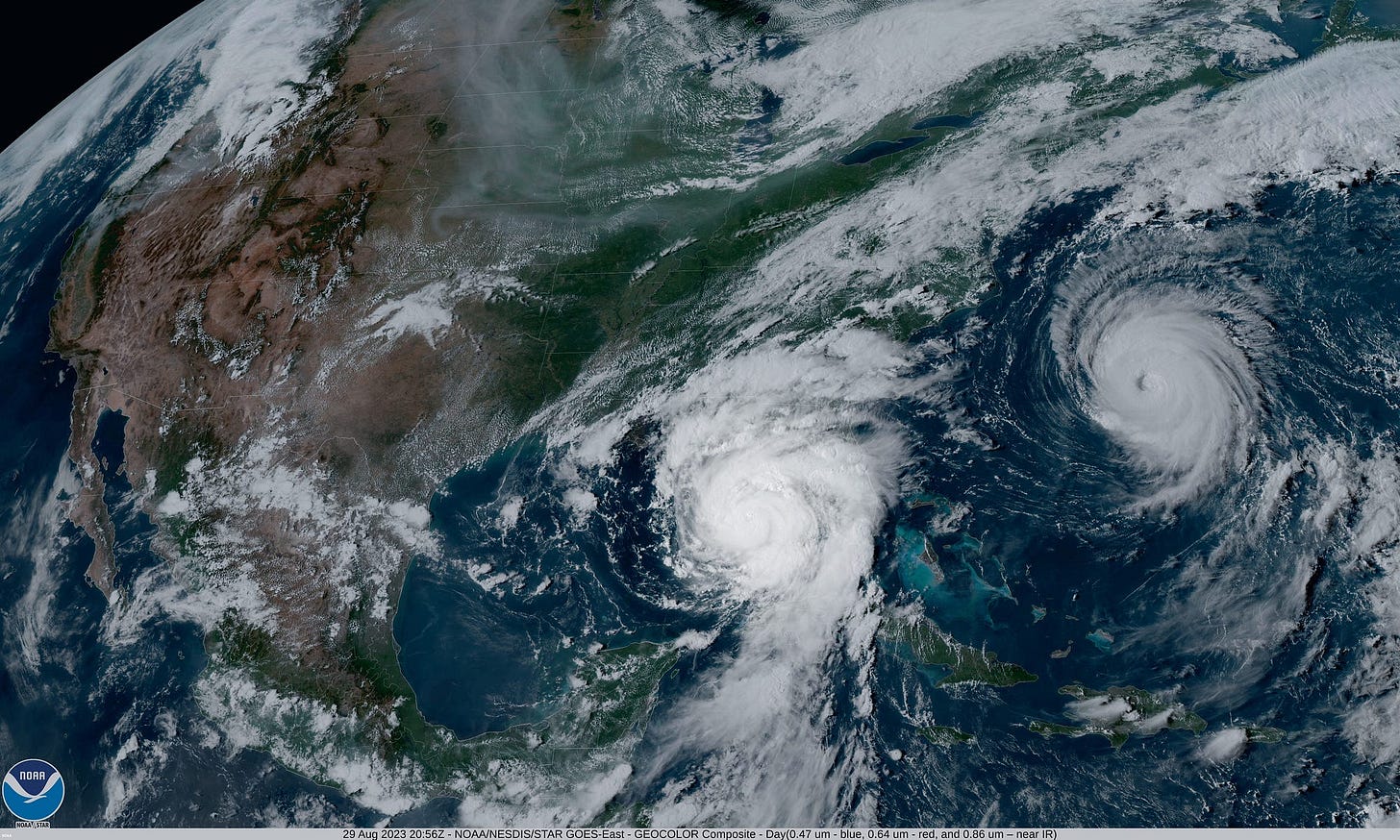
If you are from my generation, with the first grey hairs highlighting your age, you are likely among the millions of people who grew up with the regular appearance of David Attenborough as the voice for nature on television.
But as a child growing up in the Netherlands, I had never heard of him. In the limited hours per day of broadcasting in the Netherlands, Jacques Cousteau made us aware of nature’s beauty and fragility. And since practically every household watched the same television program collectively, it’s unlikely to find a Dutchman of my generation who doesn’t have recollections of watching the Calypso sailing to its next adventure somewhere on the world’s oceans.
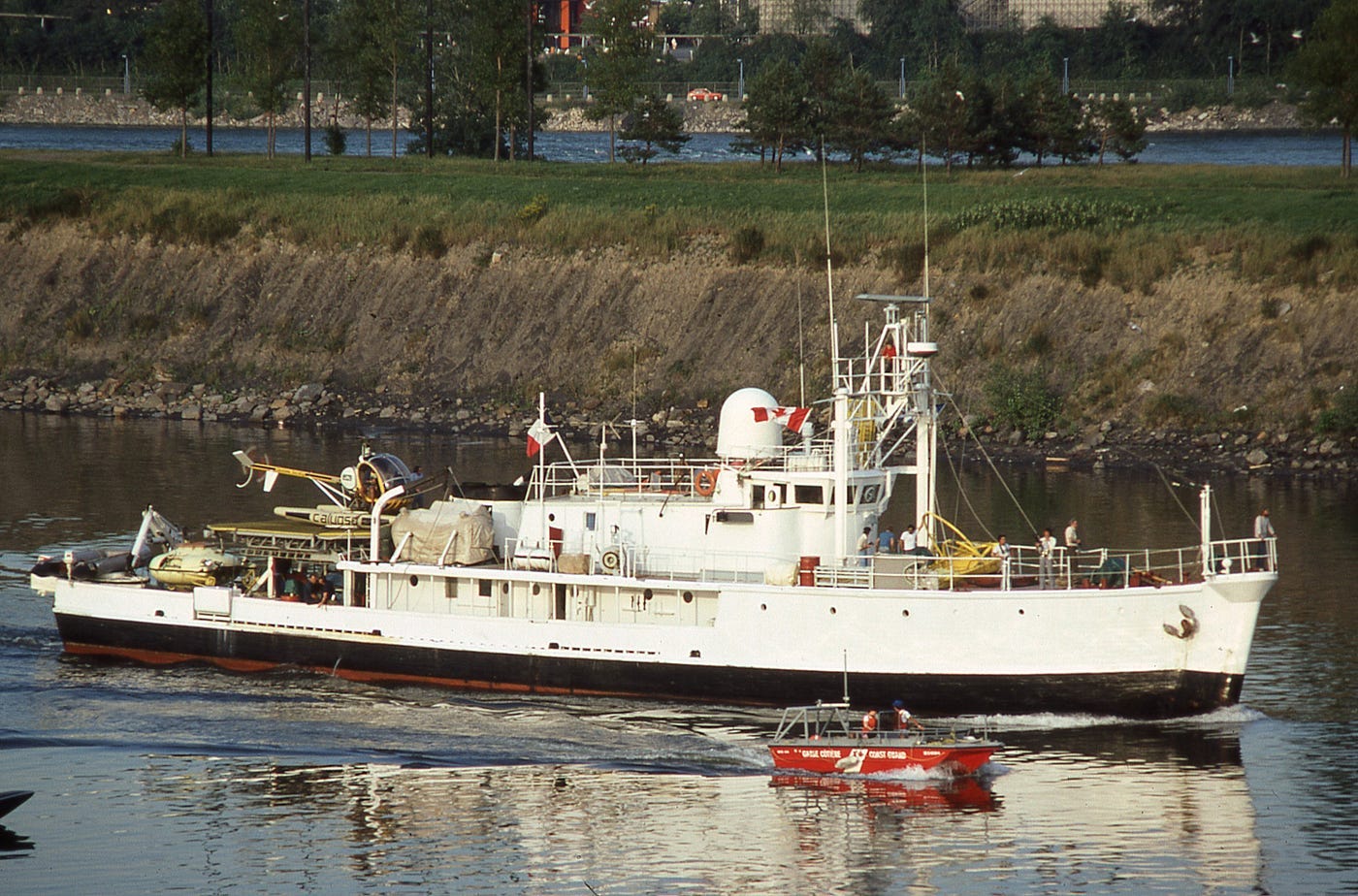
Decades before climate change slowly became a thing, either feared or ridiculed, Cousteau already warned of the dangers that warming oceans and associated risks would have on maritime life and — ultimately — on us.
Even today, when politicians and media remain mostly silent about the absurdly high, record-breaking ocean temperatures, the talk about climate change is primarily limited to extreme weather. The ocean is out of sight and thus out of love; the connections between the changing characteristics of the oceans and the impacts it will have on us, on nature, and our future lives on the planet are often ignored or misunderstood.
There is reason to expect breaking hurricane news this summer, with dramatic videos of the destruction caused in the Caribbean or the US. Watch politicians who express their shock and horror at the damage caused. Expect thoughts. And prayers. But this late spring, expect only limited attention for the first stages of the drama that may unfold in the summer. We talk about increased risk, not certainties; in a responsible society, we welcome our government agencies to predict, but we expect our leaders to prepare and prevent.
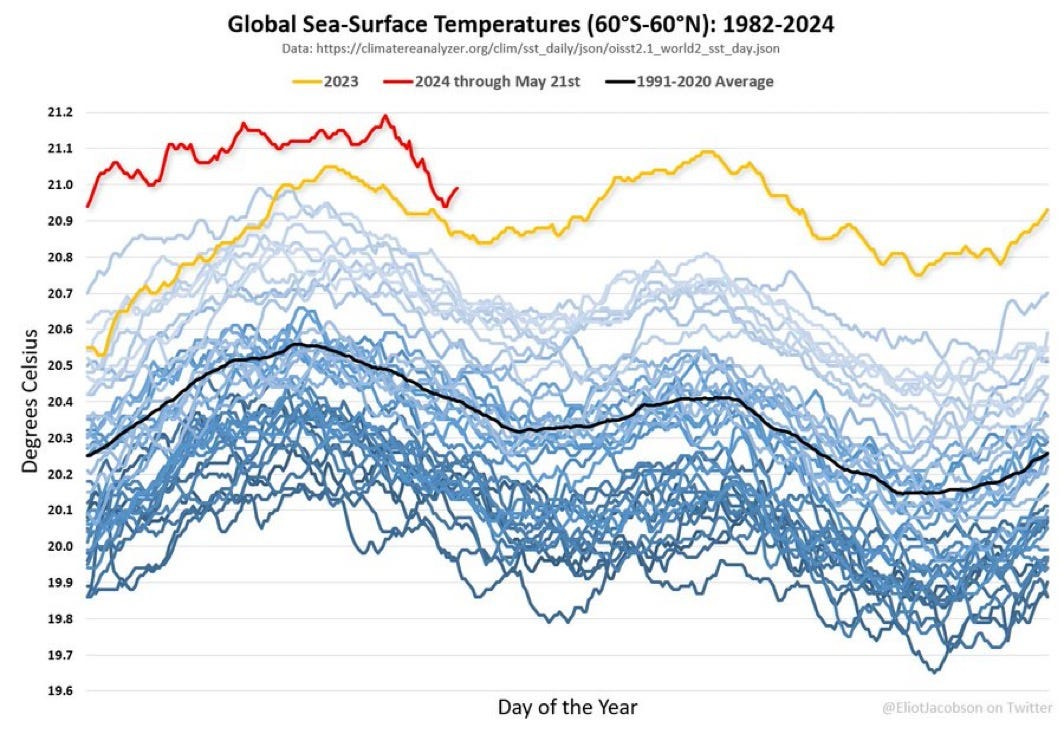
In the past twelve months, I have followed the data on the ocean’s warming practically daily, especially on the warming of the Atlantic Ocean. Plotted in a graph, the data of the past twelve months show a high-flying line of broken records, floating far above all previous recordings of past decades. This reminds us that we can’t continue emitting greenhouse gases without drastically altering essential living conditions for everyone on this planet.
Hurricanes on Steroids
In this late spring season in the Northern Hemisphere, the waters between West Africa and the Caribbean are hotter than ever. Today, this was one of the reasons NOAA, the National Oceanic and Atmospheric Administration, announced that there is an 85% chance of this year’s hurricane season being more active than normal.
The agency projects an active hurricane season with expectations of 14 to 25 named storms. Of these, NOAA predicts eight to 13 to become hurricanes, with four to seven reaching major hurricane status.
An average hurricane season in the Atlantic basin typically includes 14 named storms and seven hurricanes, three of which escalate to major hurricanes. A major hurricane is classified as any hurricane that achieves at least Category 3 status, regardless of landfall.
In the past months, many articles about climate change have mentioned a combination of global warming and El Niño as a cause for extreme weather events worldwide. A notable difference between these two causes is that the continued warming of the oceans and atmosphere results from our irresponsible behavior, while we are not to blame for El Niño.
While the ongoing worsening of the climate crisis is our primary concern, the naturally occurring variation of El Niño and its counterpart, La Niña, often significantly alter the outcome of individual extreme weather events. For those of you who welcomed the recent emergence of La Niña as a temporary relief from extreme weather perils, don’t celebrate too soon.
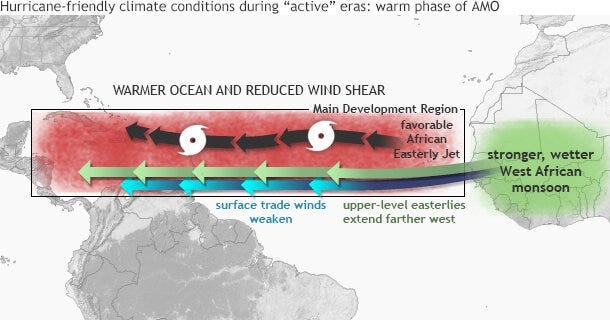
La Niña, characterized by cooler-than-normal water temperatures in the Pacific Ocean near the equator off the western coast of South America, is one of the key elements influencing this season’s hurricane forecast. Its arrival will be good news for that part of the planet since there will probably be fewer hurricanes west of South America this summer. But a downside of this development is on the Atlantic side, where La Niña is expected to lead to less wind, which makes the Atlantic Ocean basin a fertile breeding ground for hurricanes.
The most worrying data are not about La Niña but come from the tropical region between West Africa and the Caribbean; that is where most hurricanes develop, fulled by the warmth of that part of the ocean. Some areas in that region are now, in late May, as warm as is usual in late August.
The sea surface heat in more than 90 percent of this part of the ocean breaks all records, simply smashing the data for 2005, the previous record-holder for late May. Regrettably, it was a year remembered for one of the most active and destructive hurricane seasons in modern history.
It is not a given that this year will see a similar or worse destruction; it depends on how hurricanes develop and if and where they make landfall. However, the risks are significantly higher this year; the long-term trend is frightening since we continue to emit vast amounts of greenhouse gases.
Although we should be alarmed by the long-term warming trend and this year’s extreme ocean warmth, the potential destruction in the 2024 hurricane season is still unknown. You can play Russian roulette with extra bullets and still survive another round. But each summer, another round will be played, so lowering the risk by effective climate action is the best risk-reduction measure available.
Marine Life Under Stress
Cousteau would have been appalled by these data. He warned of what was about to happen and repeated his warning at the Earth Summit in Rio de Janeiro in 1992. As a renowned maritime life expert, he would also be saddened to learn about the massive scale of destruction caused by coral bleaching events, another impact of the warming oceans.
The man who taught the world to appreciate life in the oceans would have been shocked to see these maps by NOAA, illustrating how the current global bleaching event stacks up against the previous three significant bleaching events in 1998, 2010, and 2014–2017. The top three maps depict the location and intensity of coral heat stress during the peak of each of those events. The bottom map shows the peak-to-date of the current bleaching event through mid-May 2024.
Utilizing NOAA Coral Reef Watch’s updated bleaching alert levels, the maps rank heat stress on a scale from 1 to 5. This ranking is based on the severity of water temperatures compared to the average temperature during each location’s hottest month and the duration of elevated temperatures.
NOAA experts equate their Bleaching Alert Level 5 to the impact of a Category 5 hurricane on coral reef ecosystems, underscoring the severity of these conditions.
When I grew up watching Cousteau on my parents’ very first television set, environmental concerns didn’t get much attention. But if they made it to the evening news, it was mostly a local affair, such as an illegal chemical dump site.
Cousteau showed us how to look at a far larger scale of environmental destruction, but I wonder if he would have foreseen how bad the situation would become at the end of the first quarter of the next century. Climate change, biodiversity loss, and plastic pollution of the oceans have all increased to levels that were hard to imagine by the time of his death in 1997.
Did you know that clicking on the ❤️ at the bottom or the top of this post will help others discover my publication? You can also share it with others. The best way to support my work and not miss anything is by subscribing to this newsletter.
There is often something extra to enjoy on Patreon:
Or perhaps you liked the article and want to support my writing by buying me a coffee?
I always love to read subscribers’ comments:
How My Phone Helps Alleviate Climate Anxiety
My smartphone lights up, accompanied by a familiar droplet sound, alerting me to the latest news. Today, an article from The Guardian reports that a one-degree Celsius rise in global temperature could lead to a 12% decline in world gross domestic product. This message exemplifies the many profoundly worryin…
For Sale: Planet (Used) for the Bargain Price of $ 1 Billion
When the news cycle combines the words 'climate' and 'Trump,' all alarm bells go off in my office. Today was one of those days. Not surprisingly, this word combination usually appears in conjunction with words like corruption, bribes, and big oil. The Washington Post broke the news that Trump reportedly proposed a deal to fossil fuel executives. In exch…
Notes:
https://www.oceanfutures.org/news/press-releases/jean-michel-cousteaus-statement-on-climate-change
https://www.noaa.gov/news-release/noaa-predicts-above-normal-2024-atlantic-hurricane-season
https://www.climate.gov/news-features/featured-images/how-does-2023-24-global-coral-bleaching-compare-past-events
d
d
d
d







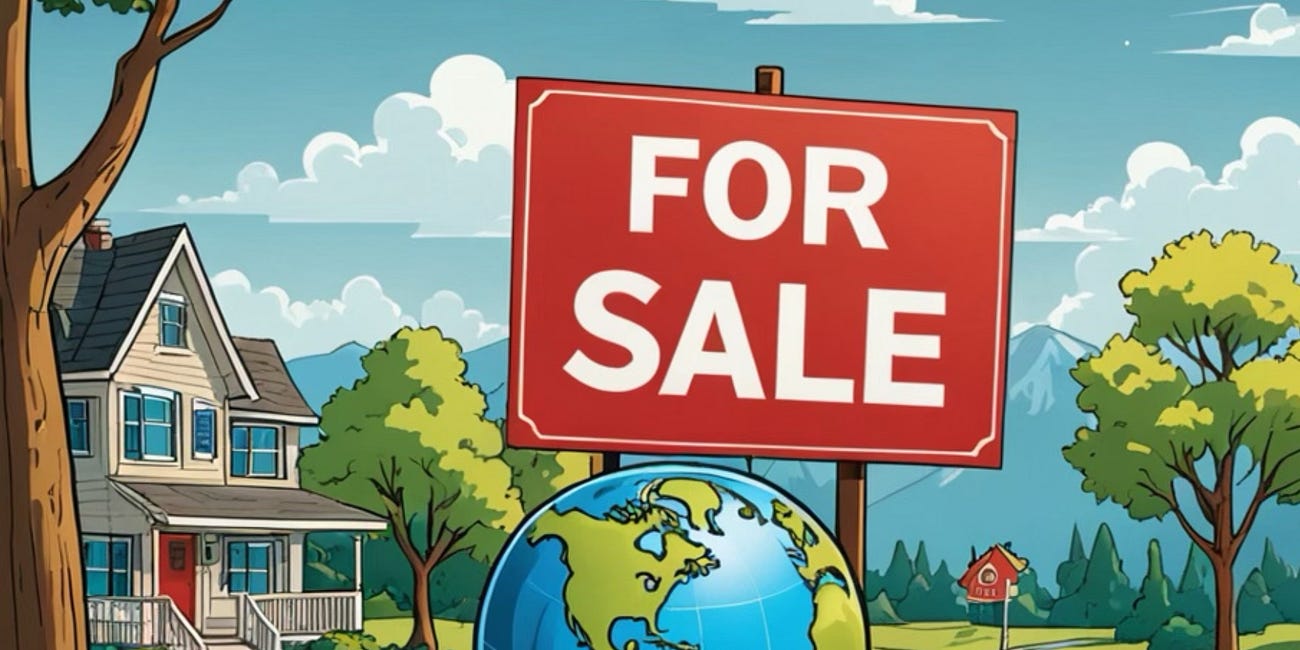
As a resident of a southeastern state, SC, hurricanes 🌀 approach and make landfall from two fronts, the Atlantic Coastal Area impacting the already flooding historic Charleston and areas along that corridor. I witnessed the devastation from Hurricane Hugo four years after landfall while living in Charleston in the nineties. There remained moldy residue in air ducts in pre-existing structures, debris on the grounds of apartments and other dwellings. The chilling experience of the notices to prepare for another hurricane were so disruptive to life there, I chose to move inland to a small town just 21 miles from the GA border. My escape was ill advised as now I am preparing for the 🌀
hurricanes that come my way via the Gulf, another predictable pattern. From the shores of AL, and along the southern border, the question becomes how intense will the storms be on arrival this far north. Observations suggest they are not predictable. I can awaken to a calm sunny morning the days after watching the storms head to “my space” or listen to the remnants of storms having made landfall South of me roar through sleepless nights, trees falling, power lines down, outages of both power and internet, unable to shelter anywhere but my familiar old house and it’s incredibly woodsy surroundings. With the expected increased severity flooding will undoubtedly be worse and could very well breach my home. Older homes are not built to withstand extreme weather and older people may not have resources to upgrade. I would have been wise as some here have done to resettle in the mountains of GA. Thank you for the truth as always. 😴
Yes, sad realities. The Planet and the People living on this earth. How to fix the mentalities of our species. How and Why We are not doing better...I wish every time I read about the state of our world, I had a wand... like the one *Harry Potter* had. Where I could just fix all the pieces and build a new puzzle. Most probably that would still not be a solution. So yes I pray. I will do this for all issues I find broken.